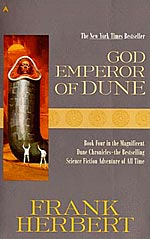
![]() Bormgans
Bormgans
1/19/2021
![]()
This is the 4th post in a series on my reread of the Dune books, and it became yet another lengthy text of about 8,720 words. I've also written long analyses of Dune, Dune Messiah and Children of Dune.
My text on Dune itself focuses on the issue of Paul as a tragic hero, without free will, and has some notes on the book as a literary construction. The one on Messiah compares it with the first book, and also deals with its relationship to the concept of eternal recurrence - a strong Nietzschean undercurrent that ties into Paul not being an Übermensch - and with the relationship between prescience and the absence of free will. The article on Children is over 10,000 words long and deals with the tragedy of Alia, change as a key concept in the series, a Nietzschean morality beyond good & evil, and Amor Fati, among other things.
I've tried to keep overlap between this text and the previous ones to a minimum, so if you're interested in a deep desert dive, please read those first.
Before I'll zoom in on Leto's conceptual character, and questions about prescience, the nature of the Golden Path and the question whether the world portrayed in this book is mystic or mechanical, I'll try to write a proper review of sorts. If you're also interested in the more philosophical matters, or in the various inconsistencies introduced in this novel, read on afterwards.
How to assess God Emperor of Dune in the series? In my recollection I thought Dune was by far superior to the 2nd and the 3rd book, but when I finished the series, I thought book 5 and 6 were the best. God Emperor is the only book I don't have specific memories about anymore.
So far, my rereads have more or less confirmed my feelings: Messiah is dumbed down to the point it became bothersome - even though the emotions saved it in the end; the intrigues and Alia's character make Children an above average read, even though conceptually it is a bit of a mess, and Herbert didn't achieve the same purity of message as he did with Dune itself.
Similarly, after rereading God Emperor, I simply don't have very outspoken feelings about it. It was an okay read, and by any standards Leto is a remarkable character - maybe the strangest character I have ever encountered in fiction. That by itself is an achievement.
The novel is often portrayed as heavy on philosophy, and I can understand what people mean by that, but I'd rather say it is sprinkled with tidbits that make you think, instead of calling this a philosophical book. Often these passages are mildly intellectually stimulating, but at the same time, taken at face value, generally take the form of sweeping generalizations about humanity. Because they often lack nuance they more than once made me shrug - Herbert's attempt at Nietzschean aphorisms do succeed once in a while, but they don't fully compensate for the main structural weakness of this book.
(...)
Please read the full text on Weighing A Pig
https://schicksalgemeinschaft.wordpress.com/2021/01/19/god-emperor-of-dune-frank-herbert-1981/